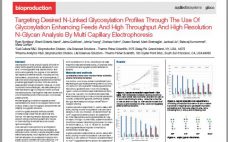Glycosylation is a key product quality attribute for many biotherapeutic proteins expressed in CHO cells. N-linked glycans may display macro- and micro-heterogeneity; the degree of this variation can depend on several factors, including cell line, media/feeds, and process. As a consequence, it has often been challenging to achieve and maintain preferred glycosylation profiles from cell culture development through bioreactor scale-up. In order to address these challenges, we have developed a new feed technology in conjunction with a unique fed-batch process…
Author Archives: Jenkuei Liu
Rapid and Simple Sample Preparation for High Throughput, High Resolution and Sensitive Glycan Analysis by Capillary Electrophoresis
Here, we report the simple and rapid GlycanAssureâ„¢ workflow that combines high throughput and high resolution glycan analysis of 96 samples in 7-9 hours using Applied Biosystemsâ„¢ 3500xL 24-capillary electrophoresis system. The process eliminates vacuum drying and highly toxic cyanoborohydride in the labeling reaction. Use of Dynabeadsâ„¢ magnetic beads for glycan purification post deglycosylation and removal of free dyes after labeling streamlines the process for automation. Capillary electrophoresis can detect less than 0.2 fmol/μL of labeled glycans. Two proprietary fluorescent…
Host Cellular Protein Quantification
Host-cell proteins (HCPs) are bioprocess-related impurities that may be present in intermediate or final biopharmaceutical products such as recombinant monoclonal antibodies (MAbs). Although the potential clinical and genetic effects of HCPs are largely unknown, studies have shown that HCPs may cause immune responses and adverse reactions in patients when present at sufficient high levels (1,2,3). Consequently, US Food and Drug Administration (FDA) and European Commission regulations require that the level of HCP in a bioproduct be quantitatively measured during manufacturing…


